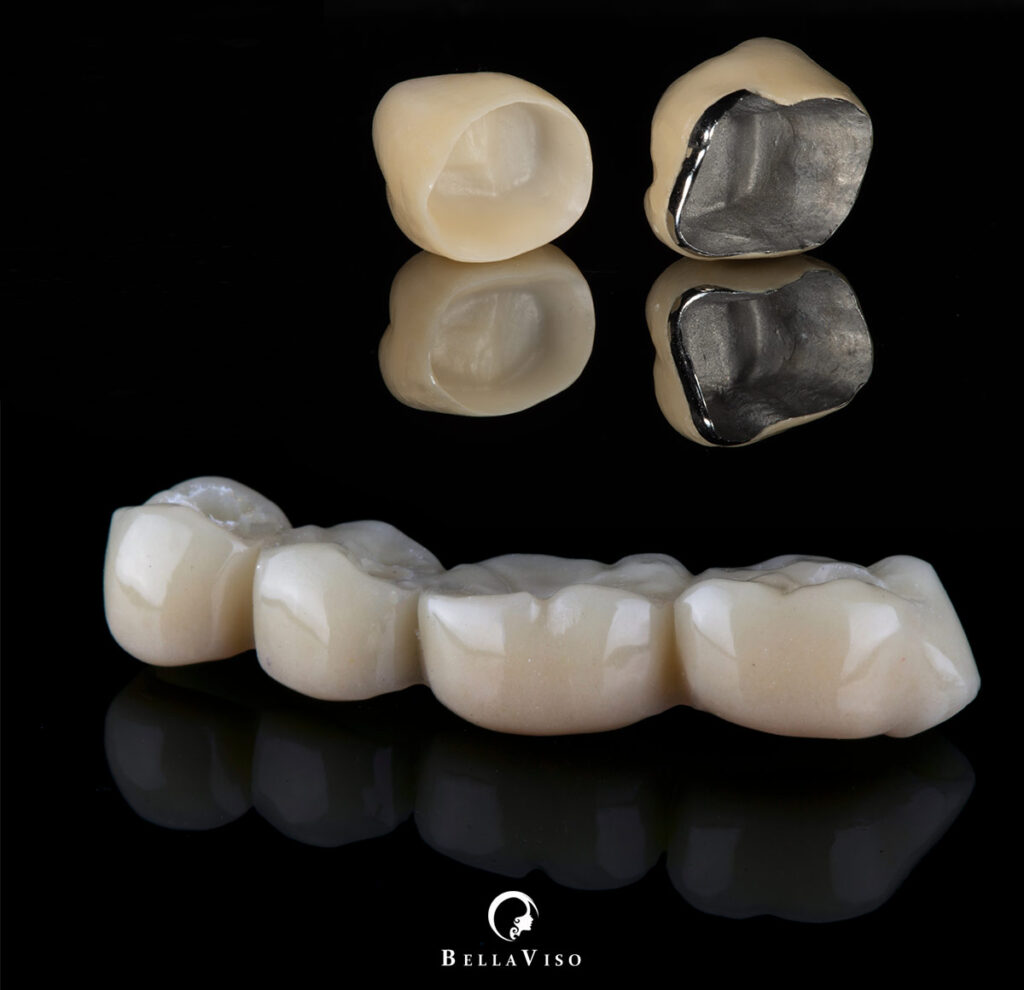A dental crown is a restoration that covers a tooth to restore its shape and size, strength, and/or appearance. A dental bridge is a fixed (non-removable) appliance used to replace one or more missing teeth by joining an artificial tooth definitively to adjacent teeth or dental implants.
Dental crowns are indicated when a tooth is fractured, when there is extensive tooth wear, when a large cavity exists and there is not enough tooth remaining to support a filling, to protect a tooth after root canal therapy, or to support a dental bridge. Bridges are indicated when one or more teeth are missing. https://bellavisomedicalcenter.ae/dentistry/dental-crowns-bridges/
Crowns can be made from a variety of different materials, including metals, alloys, ceramics, or a combination of these materials. The type of material used will be based on many factors, including where in the mouth the crown will be placed, the tooth’s function, the amount of tooth that is visible when you smile, and your personal preference.
Bridges can also be made from a variety of different materials, but they are most commonly made from ceramic or porcelain. The type of material used will be based on many factors, including where in the mouth the bridge will be placed, the tooth’s function, the amount of tooth that is visible when you smile, and your personal preference.
Crowns and bridges are usually placed by a dentist or an oral surgeon. The tooth will be prepared for the crown or bridge, and impressions will be taken of the teeth. These impressions will be used to make the crown or bridge.
Once the crown or bridge is made, the dentist or oral surgeon will place it on the tooth or teeth. The crown or bridge will be checked for fit, and then cemented or bonded into place.
Crowns and bridges usually last for many years, but they may eventually need to be replaced. Good oral hygiene, including brushing and flossing, and regular dental visits will help to prolong the life of your crown or bridge.
2. The Benefits of Dental Crowns and Bridges
If you are considering dental crowns or bridges, it’s important to understand the benefits that these treatments can offer. Dental crowns are often used to restore the function and appearance of teeth that have been damaged by decay, trauma, or wear and tear. Bridges are commonly used to replace one or more missing teeth.
Dental crowns can be made from a variety of materials, including ceramic, porcelain, and metal. They are custom-made to fit over the existing tooth and can be used to improve the appearance of teeth that are misshapen, discolored, or slightly crooked. Crowns can also be used to protect weak or damaged teeth from further decay or injury.
Bridges are made from similar materials as crowns and are also custom-made to fit your mouth. Unlike dentures, which are removable, bridges are fixed in place by bonding or cementing them to the natural teeth or implants surrounding the empty space. Bridges can help to restore chewing and speaking function, and they can also improve the appearance of your smile.
There are many benefits of dental crowns and bridges. These treatments can:
• Improve the appearance of your teeth
• Restore chewing and speaking function
• Protect weak or damaged teeth
• Prevent further decay or injury
• Support dental implants
• Preserve the natural shape of your teeth
If you are considering dental crowns or bridges, be sure to talk to your dentist about the best option for your individual needs.
3. The Types of Dental Crowns and Bridges
Dental crowns and bridges are two common dental procedures that can restore the function and appearance of your smile. Both procedures involve the placement of artificial teeth, called crowns, onto existing teeth or implants.
There are several different types of dental crowns and bridges, each of which has its own benefits and drawbacks. The type of crown or bridge that is right for you will depend on your individual needs and preferences.
The three most common types of dental crowns are:
1. Porcelain crowns
Porcelain crowns are made from a thin layer of porcelain that is bonded to a metal substrate. Porcelain crowns are strong and durable, and they can be matched to the color of your natural teeth. Read more on BellaViso.
Porcelain crowns are a good choice for people who have allergies to metals or who want a more natural-looking smile. However, porcelain crowns are more expensive than other types of crowns, and they are more likely to chip or break.
2. Composite crowns
Composite crowns are made from a mixture of plastic and ceramic materials. Composite crowns can be matched to the color of your natural teeth, and they are less expensive than porcelain crowns.
However, composite crowns are not as strong as porcelain crowns, and they are more likely to stain over time.
3. Metal crowns
Metal crowns are made from a variety of metals, including gold, silver, and platinum. Metal crowns are strong and durable, but they are not as natural-looking as porcelain or composite crowns.
Metal crowns are a good choice for people who have allergies to porcelain or composite materials. However, metal crowns are more visible than other types of crowns, and they may cause irritation in some people.



